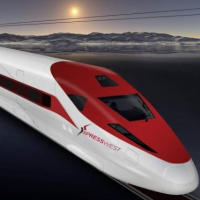China Joins Deal to Build Vegas Bullet Train that Almost Reaches Los Angeles
 (computer rendering: XpressWest)
(computer rendering: XpressWest)
What’s missing from this first line of the XpressWest homepage that touts a partnership with China announced this week in Beijing for bringing high-speed rail to western United States?
“XpressWest allows passengers to bypass traffic, traveling at speeds of up to 150 mph non-stop to and from Las Vegas in approximately 80 minutes compared to an average highway drive time of approximately 4 hours.”
There is no mention of where the other end of the track is. It is not really Los Angeles, as some media headlines indicated, but a close approximation—Victorville, and then Palmdale to meet up with the 800-mile San Francisco-to-L.A. high-speed rail line still being argued over in Sacramento.
The old news is that the proposed 230-mile Las Vegas route along the 15 Freeway suffers from some of the same disconnected planning that brought L.A.’s Metro Rail within about 1.5 miles of Los Angeles International Airport (LAX). Officials are hoping to make that connection by 2024.
The new news is that China wants in. If the project actually gets going in September 2016, as planned, the joint venture with an American company would mark China’s entry into the barely-existent U.S. high-speed rail market. The country has built more than 10,565 miles of domestic high-speed rail, according to the official Xinhua News Agency.
A consortium led by China Railway Group said it would provide $100 million in seed money for the project that XpressWest has tried to get going for years. In 2010, XpressWest―in a different incarnation, as Desert Express―said it would break ground on construction that year, but did not.
Bloomberg said federal records indicate that XpressWest has already secured approvals and permits from a number of federal agencies for the 185-mile leg to Victorville. More permits and approvals would be necessary for Palmdale.
The joint announcement reportedly did not mention how much the rail line would cost, but XpressWest has unsuccessfully sought to secure a $5.5-billion loan from the federal government in the past. Some estimates have said it will cost twice that to build the 150-mph rail line
None of this would be necessary if a West German company had built the 310-mph magnetic-levitation train (maglev) it promised in 1989. But the company ran out of money in 1991.
Chinese President Xi Jinping will be visiting the United States next week, starting in Seattle with a tour of Microsoft Corp. and Boeing Co. operations before heading for Washington, D.C..
–Ken Broder
To Learn More:
New Venture Touts $100M for Vegas-Victorville Express Train (by Eric Hartley, Las Vegas Review-Journal)
A Chinese Consortium Is Building a High-Speed Rail Between California and Vegas (by Mary Beth Griggs, Popular Science)
China Firms Sign Deal for High-Speed Las Vegas-Los Angeles Rail Link Ahead of Xi's U.S. Visit (by Brenda Goh, Reuters)
A High-Speed Rail from L.A. to Las Vegas? China Says It's Partnering with U.S. to Build (by Julie Makinen and Dan Weikel, Los Angeles Times)
China, U.S. Reach Agreement on High-Speed Rail Before Xi Visit (Bloomberg News)
- Top Stories
- Controversies
- Where is the Money Going?
- California and the Nation
- Appointments and Resignations
- Unusual News
- Latest News
- California Forbids U.S. Immigration Agents from Pretending to be Police
- California Lawmakers Urged to Strip “Self-Dealing” Tax Board of Its Duties
- Big Oil’s Grip on California
- Santa Cruz Police See Homeland Security Betrayal in Use of Gang Roundup as Cover for Immigration Raid
- Oil Companies Face Deadline to Stop Polluting California Groundwater





